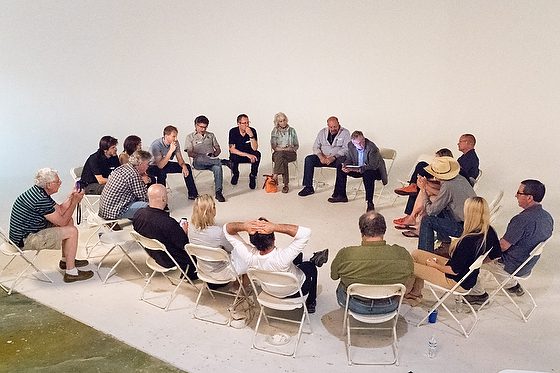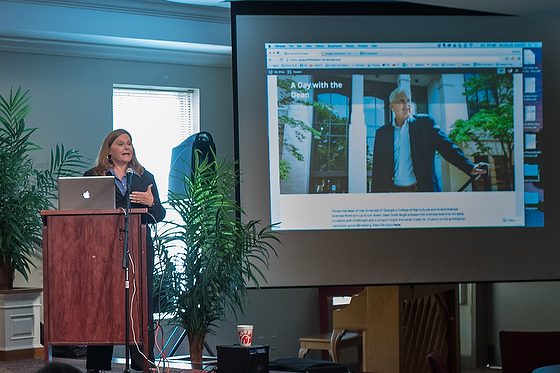| Nikon D5, Sigma 35mm ƒ/1.4 DG Art, ISO 36000, ƒ/8, 1/100 |
Last night I attended the ASMP Atlanta Chapter meeting, where the executive director Tom Kennedy shared the organization’s status. He was here to listen to the members and what they also see as a need for the organization.
When we asked the question, “What is the value proposition of ASMP?” is when we found that we didn’t have a straightforward answer.
WIIIFM – We realize that one of the first things most photographers ask is, “What Is In It For Me?”
“What Is In It For Me?” is a common theme that every business and organization must realize. We are here to serve our audience/customers. The tricky thing for most volunteer organizations is that those volunteering for the organization are also the audience.
We as volunteers are more prone to give of our time when we are getting something out of it.
In the FOCUS meeting last weekend Greg Thompson, director of corporate communications for Chick-fil-A, talked about this from the perspective of hiring new people to his team.
Greg listens for how long the person talks about what they want to get out of a job versus what they want to give of themselves. Then, he went on to speak about Truett Cathy.
“When you focus on what other people need and want it is amazing how you get what you want.” –– Truett Cathy
While there may be some examples out there on how to be indeed successful, I think, for the most part, that the way to certainly be successful is counterintuitive, which is why it is so difficult for people.

As we were wrapping up the meeting, Tom Kennedy talked about one of the most influential words he remembers shaping America when he was just ten years old from the inauguration of John F. Kennedy.
“My fellow Americans, ask not what your country can do for you, ask what you can do for your country.” –– John F. Kennedy
Ah Ha, a Moment for me.
Last night the Ah Ha Moment for me was hearing people talking about how they wanted to help the organization and were volunteering. The moment it clicked was when someone offered to go to the area colleges and art schools to talk about ASMP.
I have been doing that for the past fifteen years or more. I have been speaking to colleges and art programs regularly about business practices.
I realized that many of my colleagues were having the same trouble with volunteering as they do with talking to clients about work. Of course, they are more than willing to help and would if asked, but that is the problem.
By the way, when speaking to those groups, I represent ASMP. I also represent every other group I am a member of, like NPPA, Roswell Presbyterian Church, Atlanta Press Club, and many hats I wear. So you see, ASMP is doing a great deal. Just see what our members are already doing.
As members, we act on behalf of the organization informally all the time. Member’s actions are how new members will decide to join or not based on how they see us conduct ourselves. Many people join organizations because they are impressed with the members or stay away, saying they are just hypocrites.
Now I am not sure we see that we often create another problem when we ask a client if there is anything we can do to help. Sure there are times that if you have a good relationship already with a client, they may be able to tell you something, but the reality is most of the time, they would have to stop and think about their needs and then think about your abilities.
It is the same thing as someone coming to your house offering to help you. Often they would be embarrassed to let you see the inside of their house and then for them to know how YOU can help.
Possible Solution
Let’s take a problem situation: a family has just had a loved one seriously hurt in an accident and is now in the hospital. Calling the family and asking if there is anything I can do is not as effective as offering them some specific services that you can do for them.
Here are some ideas:
- Can I bring you a meal today?
- Can I go by your house and handle some things for you?
- Cut their grass
- Get their mail
- Check on their pets
- Pick up some clothes for you
- Your children can stay at my house, and I can get them off to school for you – can I do that for you?
When someone is in a very stressful time, for them to stop and think of things you can do for them isn’t easy. Yet, this is where genuinely service-oriented people thrive and rise to the top. Be proactive and not reactive. While you think that asking if there is anything you can do is bold, it is fishing for something that you can be reactive to doing.
Volunteer Suggestions
I think I will be taking my advice and reaching out to Tom Kennedy with some things I can offer to do for the organization.
- Hey Tom, I would like to volunteer by writing some blog posts and am willing to coordinate getting others to write some positions. Would this be something you could use?
- Tom, I have been going to area colleges and speaking on Business Practices and could videotape one of my presentations or share my PowerPoint if that could help others do that around the country.
- Tom, I would love to create a multimedia package for some of our Atlanta chapter members who are great success stories on how they are helping clients reach their goals.
I think it is easier for the organization to react to my proactive actions than for me to ask what I can do for the organization. By the way, all this bold conversation about helping your associations you might be a member of also works for how to get more jobs.


